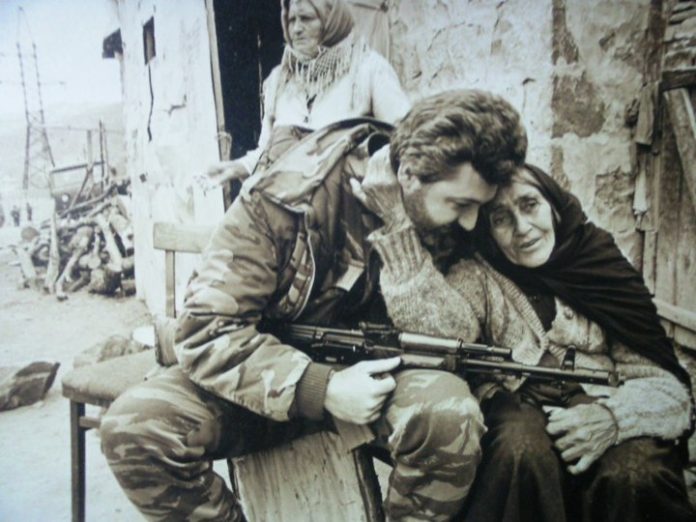By Raffi Bedrosyan
Sarkis Hatsbanian, Karabakh war veteran, political commentator and activist, passed away last week in Lyon, France. He was only 55.
Born in Adiyaman, southeastern Turkey and former Cilicia, he had left for France in 1980 to avoid persecution of the military dictatorship in Turkey, and then had moved to Armenia to join the Karabakh war in 1990. He participated in the liberation of the Karvajar (Kelbajar) region joining Armenia to k A photo of him with an elderly woman became a symbol of the war. This photo had two stories, one very real, the other a complete lie. The real story was as reported by a French journalist who accompanied the Armenian forces during the campaign, depicting Sarkis with an 80-year-old Azeri woman, Shaikha Hanum. She was left behind, along with other elderly Azeri women and children in the Karvajar district, when all the able-bodied Azeris had fled ahead of the advancing Armenian forces. Her son was a police commander in the district. Sarkis was in charge of taking care of the Azeri civilians, and eventually providing safe passage to Gandzag (Kirovabad). Armenians took such good care of the civilians that Shaikha Hanum stated she loved Sarkis more than his cowardly son who had abandoned her. On the same day that this story and photo was published in France, a fake story was posted in the Turkish daily, Milliyet, using the same photo, depicting Sarkis as an Azeri soldier, rescuing his Azeri grandmother from the Armenian enemy…

After the war, he became politically active and a fierce critic of the bribery and corruption of the oligarchs in the government and in the church, expressing his views very eloquently and articulately during frequent TV appearances. Sarkis and I met and became fast friends when I took groups of hidden Armenians from Turkey to Armenia. He was fascinated by this new Armenian reality. He would follow our tour itinerary and meet us at museums and churches that we visited, becoming a volunteer guide, counsellor, mentor and lifelong friend to our hidden Armenians.
When he was struck by cancer this past summer, he had to move to Lyon, France to receive the required treatment, in a race against time. He needed a place to stay during the treatments and was in dire financial need. Our numerous pleas for some financial assistance from heads of Armenian organizations, influential or politically active Armenians in France or Europe fell on deaf ears, unfortunately. Ultimately, a fundraising campaign was organized in Canada to send emergency funds to Sarkis and his family, with a few anonymous donors from Turkey also contributing. He passed away disappointed and dejected by the apathy of fellow Armenians.
And now, as soon as he passed away, the accolades and eulogies by Armenian Diaspora leaders rise to the sky for the “Karabakh war hero.” We have a saying in Armenian — “Kna merir, yegour sirem,” meaning “First go die, then come let me love you.” Perhaps this attitude is unique to Armenians, because I cannot find such a cruel but poignant proverb in any other language.








